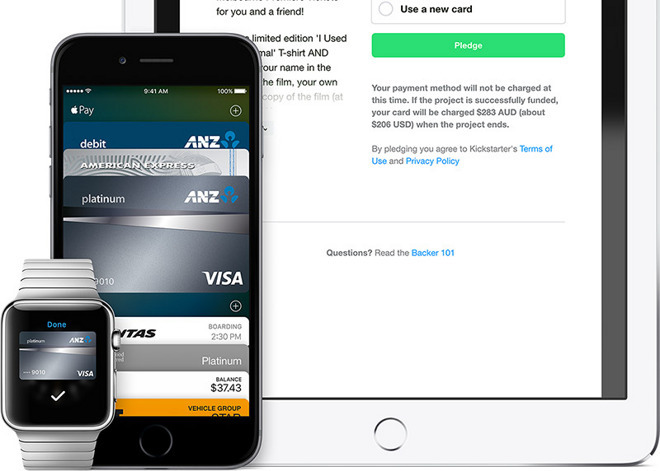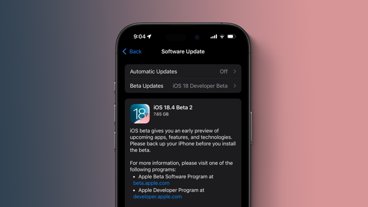Three of Australia's major banks on Wednesday filed a joint application with the Australian Competition and Consumer Commission to force Apple into negotiations over the installation of third-party mobile payments software on iPhone.
A spokesman representing Australia's three biggest lenders, National Australia Bank (NAB), Commonwealth Bank of Australia and Westpac Banking Corp, told Reuters the banks believe Apple's restrictions on third-party mobile wallet solutions amounts to anticompetitive behavior.
By filing the ACCC application, the banks seek approval to collectively negotiate the installation of non-Apple Pay software on iPhone hardware, the report said. Currently, Apple only allows its own in-house mobile payments system Apple Pay, and the corresponding Wallet app, on iOS devices.
According to the The Sydney Morning Herald, the bloc wants open access to iPhone's NFC technology.
"This is about providing Australians with real choice and better outcomes," said Lance Blockley, a senior advisor at Novantas speaking on behalf of the banks. "If successful, the application would have tremendous benefits for the entire Australian mobile payments landscape including for public transport fares, airlines, ticketing, store loyalty and rewards programs and many more applications yet to be developed."
The complaint comes eight months after Apple Pay launched in Australia last November through a limited partnership with American Express. At the time, none of Australia's big four banks offered support for the service, and Apple continues to face staunch resistance from an entrenched local finance sector.
In April, ANZ became the first major Australian bank to break rank and offer support for Apple's fledgling payments service. Two weeks later the bank noted a 20 percent spike in online credit card and deposit account applications. Following that news, NAB, Commonwealth and Westpac, the three banks that filed with the ACCC today, were all said to have reentered negotiations with Apple.
 Mikey Campbell
Mikey Campbell








 Brian Patterson
Brian Patterson
 Charles Martin
Charles Martin


 Malcolm Owen
Malcolm Owen
 William Gallagher
William Gallagher
 Christine McKee
Christine McKee
 Marko Zivkovic
Marko Zivkovic







59 Comments
I was one of those customers that signed up for an account with ANZ as soon as they announced support for Apple Pay. I knew it would take a while for the other banks to jump on board and I could have guessed something like this would have happened.
Very hypocritical of them to talk about anticompetitive behaviour when the big banks here do all they can to limit competition themselves to protect their profit margins.
They just want Apple to allow them access to the NFC chip so they can release their own apps and not pay Apple a cent for the privilege.
Hopefully some of the smaller banks will also start to support Apple Pay here soon and more customers can make the switch away from NAB, Westpac and Commonwealth. Then they might learn the value that Apple's platform could provide them.
Apple's implementation is the only RFID one that I've seen that genuinely offers privacy to the consumer (by hiding the credit card details from the retailer and merchant service provider. I'm sure there are some, but I've not seen them here in Oz.
NAB, Westpac and CommBank all have RFID solutions of their own that have no security or privacy controls (from plastic cards to apps on Android).
From my PoV - Apple, far from stifling competition, are the only ones providing competition.
Finally - the reuters article is misleading "
This is about RFID, not phones, and hopefully if Apple's solicitors can make that case then the ACCC will see the complaint has no merit.
Typical approach of a banking cartel:
- speak of vibrant competition while actually preserving status quo or consolidating;
- reap profits;
- fund politicians;
- receive desired legislation and political support;
- raise barriers to entry for potential new competitors;
- privatize profits while protecting for socialized risk;
- avoid innovation and customer oriented investment (unless it dramatically decreases operating expenses);
- if you do innovate, take off the shelf systems that you can control (vendor must always be subordinate);
- if a new entrant appears boycott;
- if new entrant's efforts gain traction, raise regulatory challenges;
- if regulatory system doesn't belong to your lobbying organization, begin negotiations to work with vendor with hope that regulatory threats, or homegrown alternatives will be enough to tame demands of vendor.
If if the system isn't corrupt, then for the banking cartel to get in bed with a strong competitor, it takes customers switching loyalties to get things moving, and something like the Kubler Ross stages of grieving to get through.